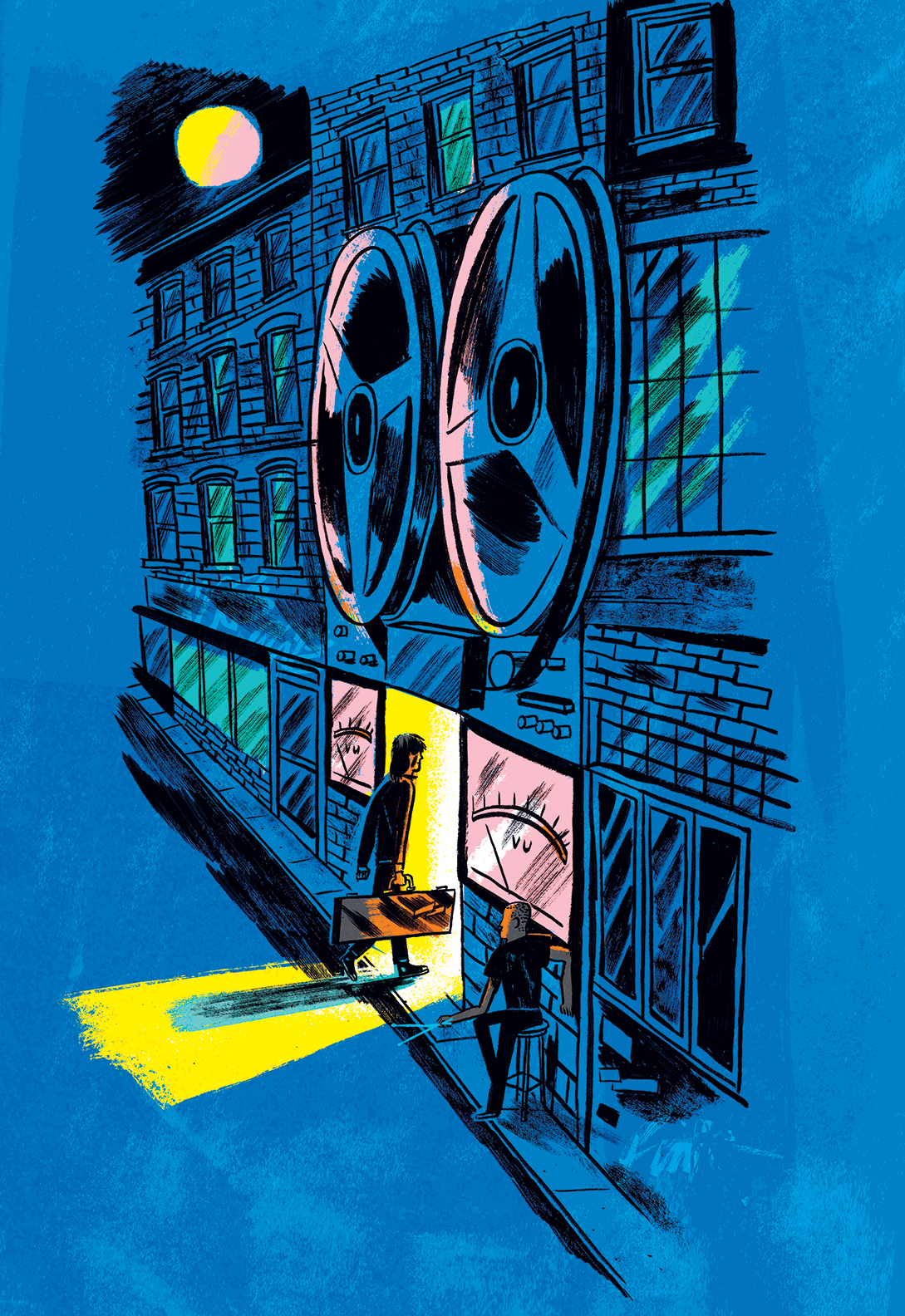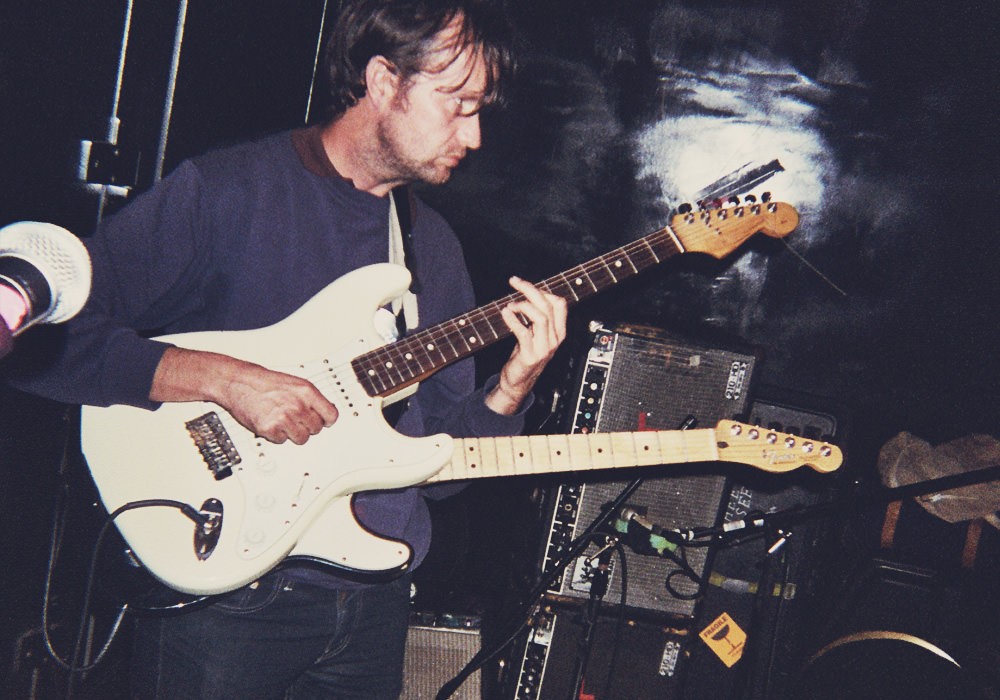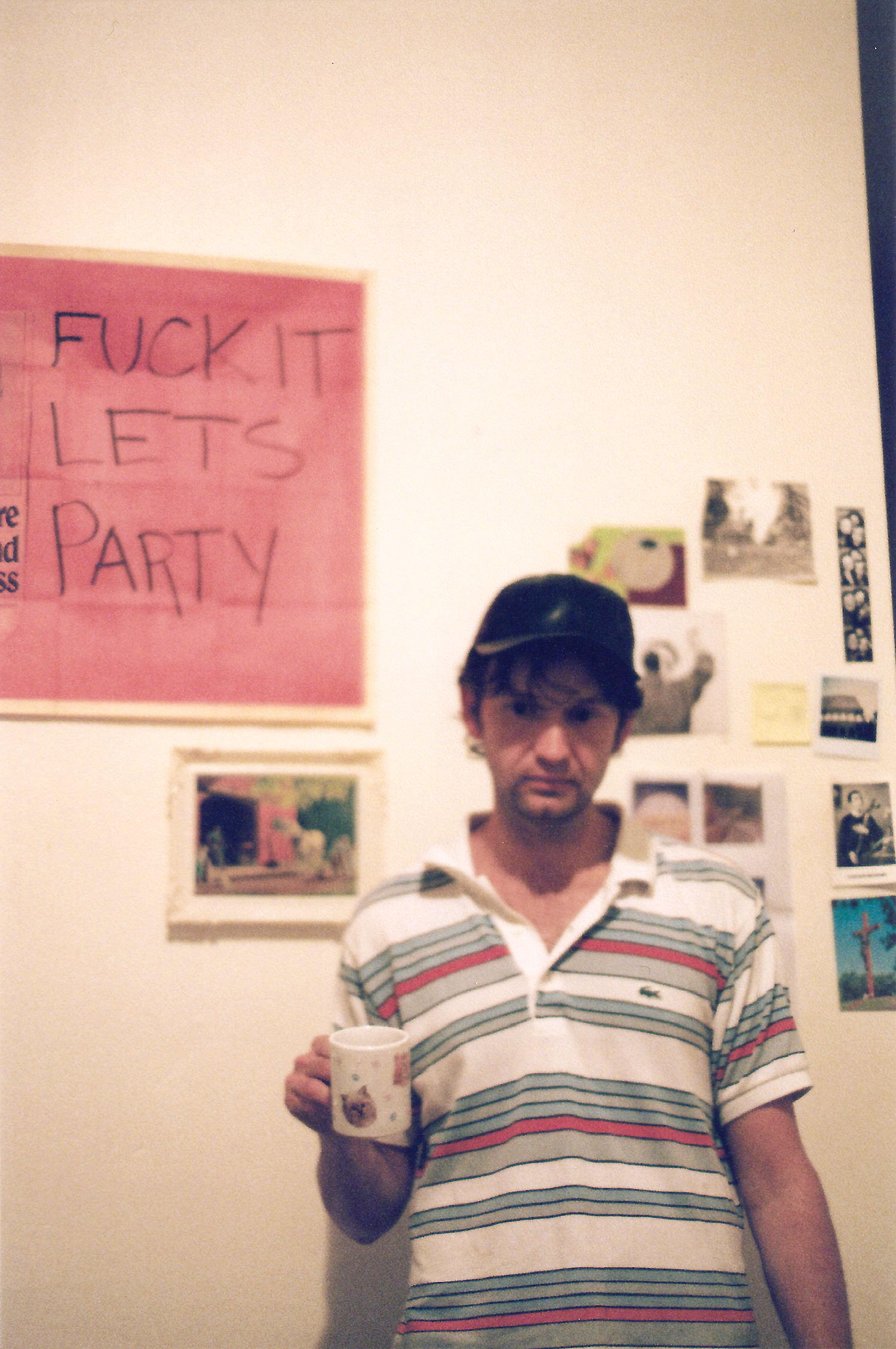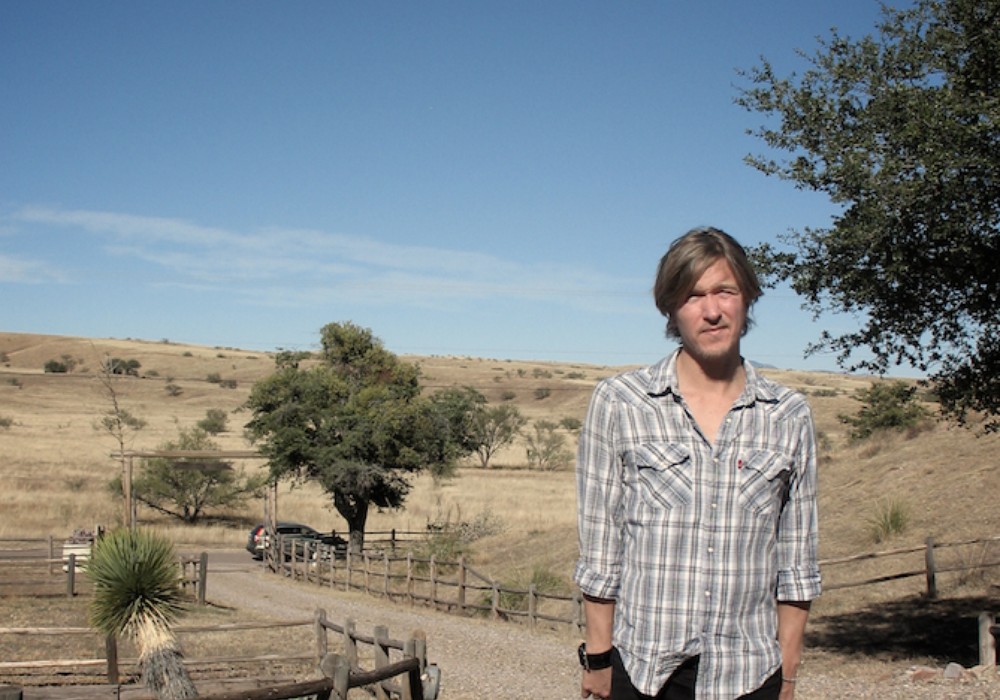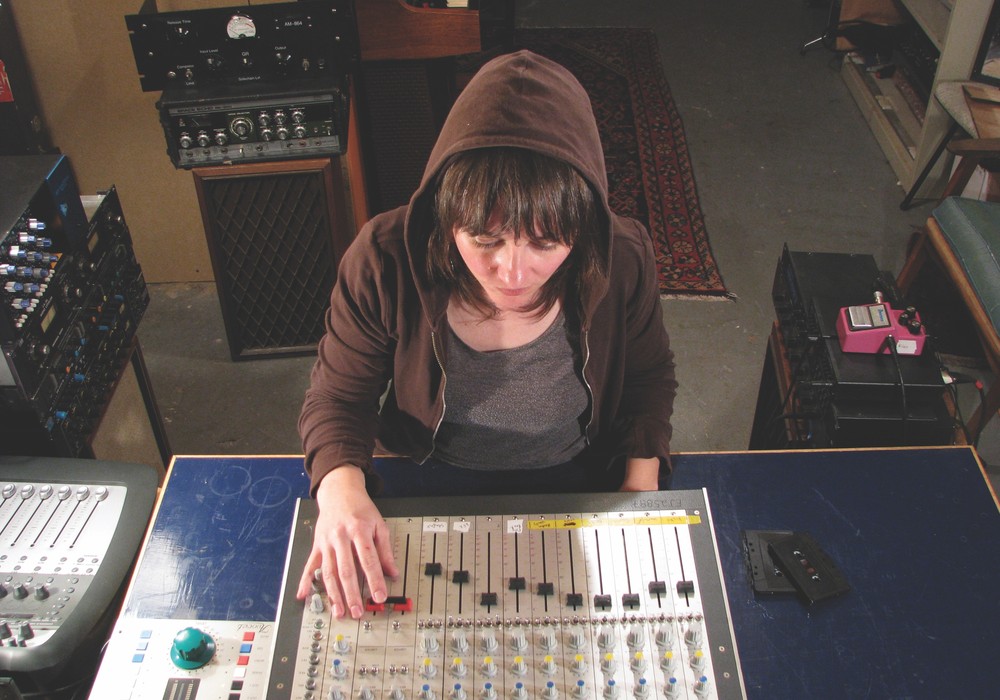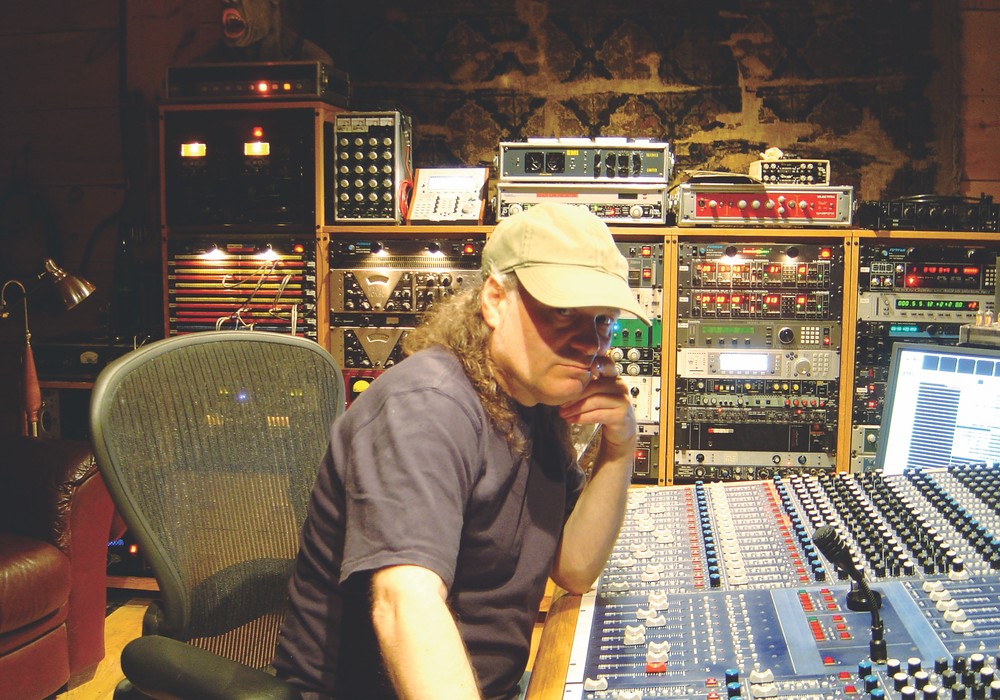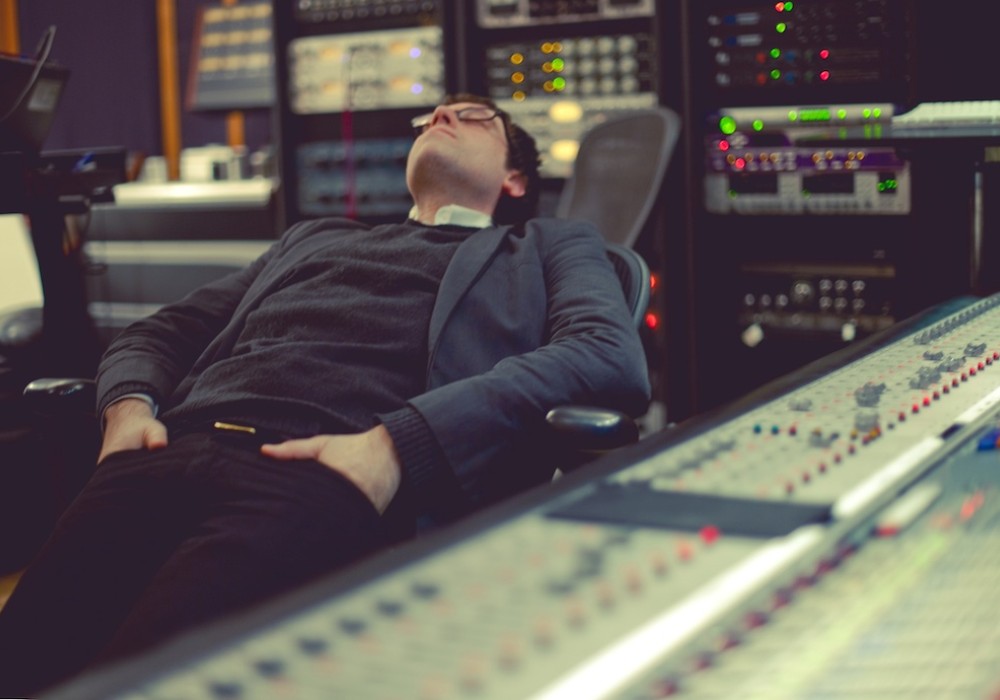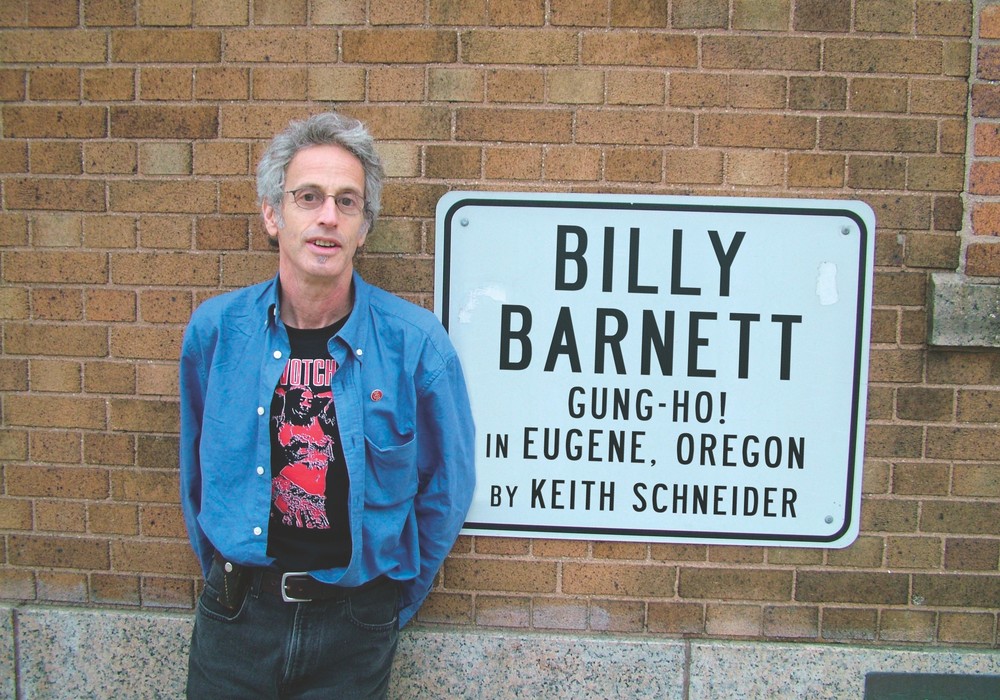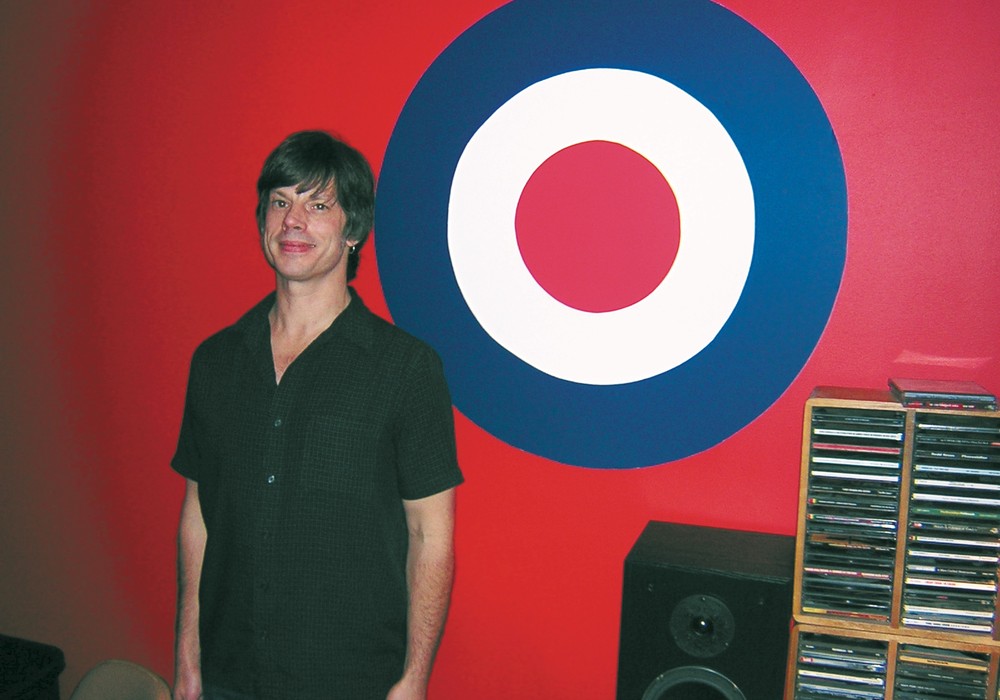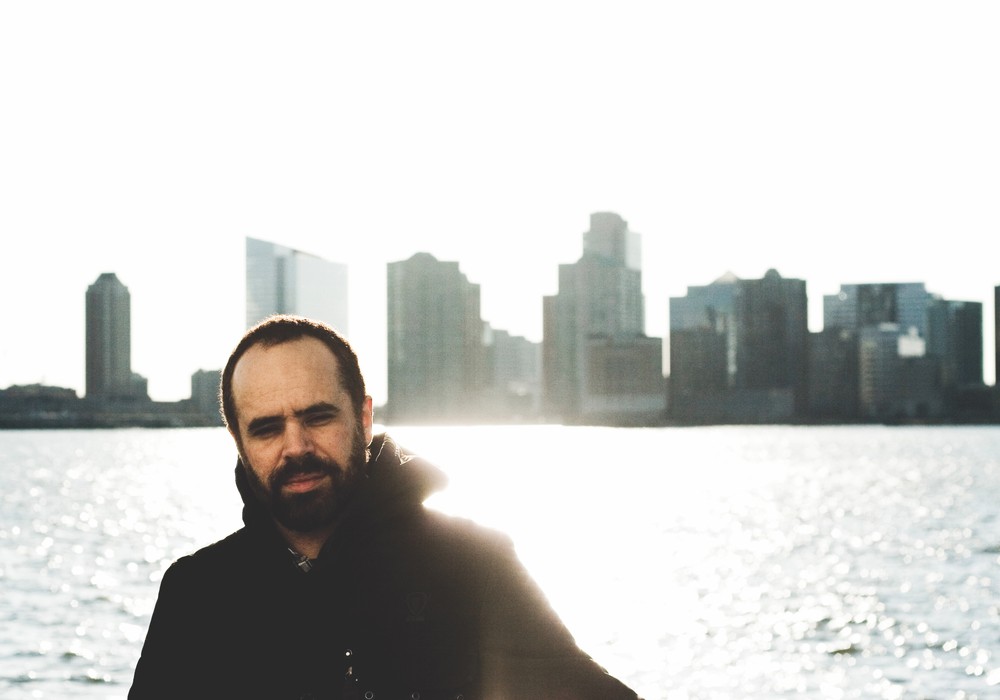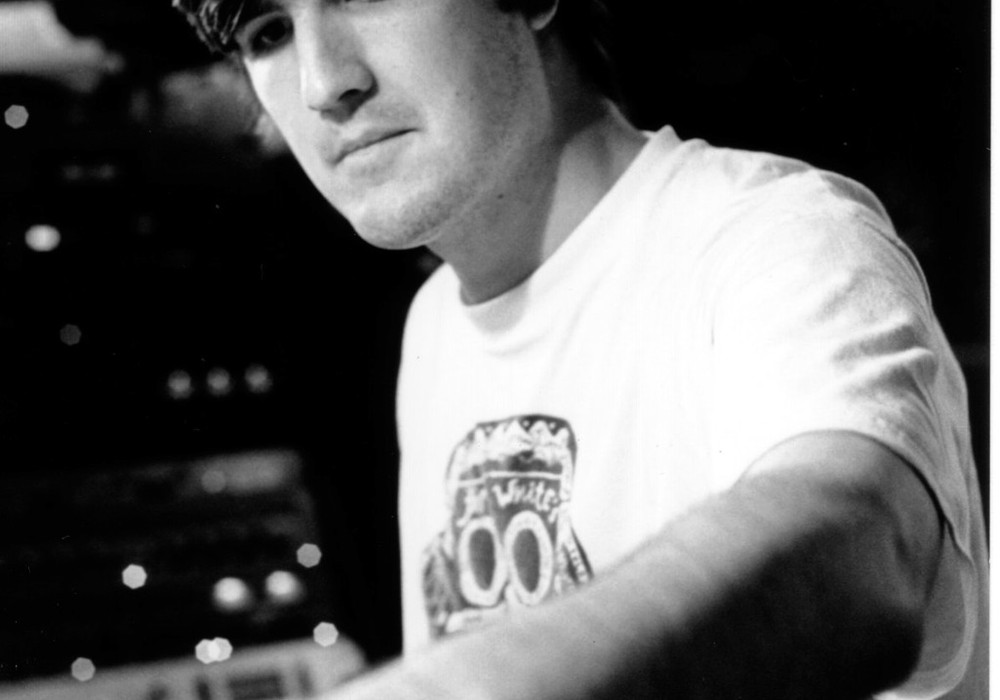If you’ve purchased an Australian rock record made in the past decade, there’s a good chance Mikey Young had his hand in the final product. He’s a member of Eddy Current Suppression Ring, Ooga Boogas, and Total Control. When he’s not touring, Young is busy recording, mixing and mastering records for bands such as Bits of Shit, Royal Headache, UV Race, Life Stinks, and Kelley Stoltz. He was kind enough to speak to us about his early musical influences, working in a record factory, and the trial by fire of learning to use a reel-to-reel tape deck a day before a recording session.
Feature Photo by James Vinciguerra
What were some early records that influenced you growing up?
I was heavily addicted to Kiss and Rod Stewart for the first few years as a kid, and then listening to MTV. Maybe I found out who Jimi Hendrix was when I was ten or so. I remember grabbing a Velvet Underground cassette around 14, and being pretty changed by that. I remember a girl at school’s brother had Devo’s Freedom of Choice when I went to her birthday in grade one.
Did any of those bands draw you into guitar being your first instrument?
Definitely. Actually the first song that my brother taught me was “Mongoloid” by Devo. I think year eight I got an electric guitar and I started jamming with my brother for a couple of years and then briefly was in some bands. I remember my brother’s friend came around with a 4-track one day when I was about 17, and it was the first time I saw the concept of, “Wow, you can record stuff on stuff.” I was blown away. Weirdly I got a digital 4-track first. A FD-4; one of the first digital ones from Fostex that recorded on an external Zip drive. I think the next step from there I was able to save up enough money to buy a [Digidesign] Digi 001 and a computer.
Were you growing up in Melbourne?
I was an hour out of the city in a town called Frankston. There wasn’t a live music scene down there. I moved to the city [Melbourne] when I was 21.
And you were working at Corduroy Records?
I was working at a warehouse and I was getting sick of it. I guess another big influence was I loved the early Kinks stuff and [The Kingsman’s] “Louie Louie,” but I didn’t know how to get access to a thousand songs that sound exactly like that. I didn’t know what Back from the Grave [garage rock compilation] was or anything like that. There was this local band called The Breadmakers, who were kind of a Slim Harpo cover band. The guy who was in The Breadmakers, Nick Phillips, bought the last pressing plant in Australia in the early ‘90s, when you could buy that stuff for scrap metal. It turned out the factory was right around the corner from my Mom’s house. I think I’d heard he sold records out of there too, so we rang him and went down there. They also had distribution of overseas garage and punk stuff. And I thought, “Wow, here’s all that music that I kind of knew of but didn’t know where it was.” About six months later I saw an advertisement for a job there. It was the only time they had done that, because it was a pretty small place, only about six people. Luckily I knew a few mutual friends of friends who knew him, and they all said he should hire me. I did write a resume, but they were more interested in what kind of records I had at home and sussing me out to see if I had dodgy taste, which I probably did at the time – I must have just snuck in. I got the job and then I pretty much ran the factory for five years. Then it got sold to a guy that runs a hip-hop label down here. He moved it to a better factory, but I think he quickly realized that running a record pressing plant in this day and age is really not fun. It’s so expensive to do down here. You have to buy every bit of raw vinyl from overseas.
I can’t even imagine.
Yeah, that’s why half, actually way more than half [of bands], press their records in America. We’ll make them as cheap as possible and we’re still going broke.
Does that curb bands from making 7-inch records?
People have realized it’s not that hard, and also over the last couple of years our dollar jumped in value to pretty much equal the American dollar. It used to be sixty cents to the dollar. So the cost of making a record for us came down.
With Eddy Current Suppression Ring, you all met at the record plant?
No, my brother knew Brendan [Huntley] through skating and graffiti. I met him a couple times, and it just so happened that he needed a part time job, so I got him a job at Corduroy. Brad [Barry], the bass player, was in a band with me and Danny, my brother, when we were 15. He’s been a friend of my brother’s since we were young.
So it fell together pretty quickly then?
Yeah the first thing was a Christmas party at Corduroy. Danny and Brendan and I were the only people left, and we were sitting around drinking. Everyone practiced at Corduroy. I started playing guitar and Danny the drums and Brendan was kind of drunk and wanted to sing or yell. There was a little ghetto blaster there, and we pressed record on it and Brendan yelled into it. We couldn’t hear him. We got home, I put the cassette on, we were still drunk, and I was like, “This is awesome.” Usually the next day those kinds of things aren’t so awesome. I listened the next day and I thought this is still kind of awesome. And that ended up the B-side of our first 7-inch; that actual recording. All we ever wanted to do was put out one 7-inch and play one show to say we’d done it, because we were working at the plant. And then it just carried on for a few years.
On the first 7-inch, Get Up Morning, you didn’t just use that boom box did you?
“So Many Things” was on the boom box. A few months before that, Nick, my boss, [who] knew that I had a Pro Tools at home, turns up to work one day with an Otari 5050 [tape deck] and a big, old Chilton mixing desk. He says, “You know how to use all this stuff, don’t you Mikey? You know how to record bands? I just bought it all.” I said, “Not really.” He said, “Yeah, yeah. I’ve got The Hekawis coming down from Brisbane this weekend. You’re going to record their album.” They were literally coming down the next day. I’d never recorded a band in my life, and I’d never used a reel-to-reel. I had no idea how to set up mics, but he said, “Yeah, it’ll be fine. Just record their record.” So I did it, it came out, and people liked it. Then Nick just kept making me record his band, and a couple months later when Eddy Current recorded down there, I knew how to operate stuff. We had a second practice and I set up some mics and recorded the two songs on the A side of the 7-inch.
What kind of mics did you have?
Jeez, I don’t even know. I think I owned a [Shure SM]57 at home. That’s all I owned! I think I had a couple of SM48s.
With Eddy Current’s Primary Colours, was it the same setup in that room with the same board?
We did two 7-inches, and it was 2006 [when] we did the first album. That was just in another rehearsal room down the road. Corduroy had fallen apart in not great circumstances; I was pretty pissed at my boss, even though we’re really, really good friends now. I think he owed everybody money. He kind of disbanded the business in a not too desirable fashion, and I think I unspokenly took the mixing desk and the 5050 as some kind of retirement fund. I took the 5050 down to the rehearsal room. I don’t think I had any preamps at the time, but the 5050 has some gain knobs at the top and I just plugged every mic I had straight into the machine and we recorded that way. The whole thing was live and I think we did it in three hours. But by the time we got to Primary Colours, our live sound guy, Lachlan [Wooden], worked at a studio called Sing Sing South, which is a legit studio. I liked the way we did the first one, but I thought it would be nice to have their mics and a room that sounded good rather than our rehearsal room. I took it home and mixed it in my bedroom. So that album was recorded a bit better. I think if that record suffers anywhere it’s because I was still pretty green when it came to learning how to mix and learning how to make stuff sound big and bold. But that’s part of its charm.
Did you mix that record on the board or in the box?
On that one I was still using the Chilton, this old British desk, and mixing it as a stereo pair into Pro Tools. I think I had one valve compressor at that stage. Actually I still only have one, so I wasn’t running a shit ton of outboard gear or anything like that.
And as far as the mics, it was whatever the studio had available?
Lachlan engineered it, because he worked at the studio. So the way we got to record there was we got the “super mates” rate, and he chose all the mics. I remember looking at them and thinking, “These are mics.” It was a big step up as far as that’s concerned.
Was he using eight mics on a kit instead of three or was it still a simple setup, just using better mics?
I said I didn’t want to change things too much to him. I think to this day I’ve never had more than an eight channel interface or reel-to-reel, so I’m at least restricted to the basic tracks being just that.
Would you ever want to expand that, or do you like the constriction?
I can’t figure out [if it’s] because I like the constriction or if I’m lazy, but I think it’s a little bit of both. It sounds so audacious to me, but 16 tracks in a real person’s world is tiny I guess. Usually I like to travel light. A few years ago I got really sick of carting the 5050 around and realized that putting it in the boot of my car and going for long drives wasn’t actually very good for it. I got eight channels of valve preamps in a rack, and I take that and a laptop and an RME interface. I’ve got a bag of mics, not many. Just eight mics and I’ve got a bag of cables. It’s always the same minimal setup. I don’t have 20 drum mics to choose from. I’m always pressed for time so I don’t want to sit around for half the day and try out six different kick drum mics. I might get a better kick sound in the end, but I bet the band would be bored shitless. Because I’m mixing a lot of stuff I don’t record, a lot of it comes with two mics on every guitar, and bass amp and a DI, and two room mics, and half the time I’m like, “That room sound is doing nothing. Get rid of that. That second guitar mic is doing nothing. Get rid of that.” Half the time I end up back at eight tracks anyway.
You were writing music for Eddy Current, and then Total Control came around. Was that more of, “I have this pile of songs that doesn’t really fit within Eddy Current” or was it more, “I just want to try this thing that’s in my head, but I haven’t written it”?
I think I get a little bored, and I’m not a self-sufficient musician. I don’t write lyrics or sing myself so I can’t just go and work on my solo project. I need to bounce off other people to get things happening. Eddy Current had limitations, on purpose. I never wanted to use pedals in that band. I always wanted to use the same guitar amplifier. My idea of starting the [Ooga] Boogas and Total Control were just to stay fresh, and to enjoy making music as long as I can. I’ve never really made music with a career focus, so I think the only way I can get old and still love making it is to keep trying new stuff. It’s fun to learn again. I don’t know much about dance music, so why not try to make it? It’s fun to be naïve and clumsy about what you’re trying to do.
Were you writing the Total Control material on keyboard primarily or was it on guitar to start?
The first stuff was just me doing a drum machine and guitar and sending him [Dan Stewart of Straightjacket Nation] a demo of that. I’d always liked messing around with synth sounds. I think when Total Control started, Dan and I just wanted a bedroom project. I think we were kind of into Gary Numan and The Screamers at the time, and just wanted something that was bit less “band focused.” Something we could get together and do in the bedroom on a weekend. I guess that accidentally turned into a band.
So with that record were you using the 5050 again?
No, that was different again. Lachlan was now our Total Control live sound mixer as well. He’s got a tiny little home studio in his garage, with a small control room and small drum room. And he’s got a 1-inch, 8-track and nice desk. We booked him out for a day, and we put the drums in one room and put one guitar and bass in the other room. I took the basics tracks back then we added all the stuff separate. There were a couple more electronic songs that we started from scratch in our places.
I’m curious what the longest time is you’ve spent in a studio working on a record?
I could say I did this album in a day, but when I say that I take it home and mix and overdub things. It still takes time. But as far as “I’m in a band and I’m recording in a studio” maybe as far as a band I’m in, maybe two days. Which was Primary Colours. I think the new Total Control album was two days. Boogas albums, two days. I’ve never spent more than two days on the majority of a record. As far as recording another band that I’m not in, I think the longest was four days.
Is that because you’re so well rehearsed?
I think for my bands, especially Eddy Current, we’re just a band that doesn’t have overdubs and the singer sings live. I always thought that if you can’t record the song well that you want to record in three goes, then you shouldn’t be recording the song. Especially for a kind of garage rock song. You don’t even want to get it perfect. It hardly gets any better after the third take.
If you’re in the band and then you’re also engineering the record and you’re also mixing the record and maybe even mastering it, how much time to do you give your self off from hearing the songs before you mix and then how much time before you master?
With Eddy Current records I’d try to go home and let them sit for a couple of days and I never did. I was too curious. At midnight I’d be listening to them. The first Total Control record, after finishing all the recording and piecing it together, I went on to master that record myself. I don’t think I did a bad job or anything but I think I tweaked my brain out. I was involved in too many parts of that record, and I was kind of a nervous wreck by the end. That band’s records don’t come together like an Eddy Current record. They are more stylistically complex. But if I’m going to be so stupid as to attempt my own mastering, I usually try and let it simmer for weeks so I can have a different headspace to attack. The new album we just finished I said, “Can we get someone to do it this time?” I really need outside opinions and ears at this point. And [the band] said, “For sure.” When someone else does it there’s a finish line. If I master it, I have it in front of me every day. My studio is in my house. I can always unmaster it, remaster it, and tweak and tweak and tweak. To get someone else to do the final product is a good slap on the wrist to say, “Just stop it.”
What’s your setup at your house for mastering?
Pretty small. I should preface this whole thing by saying that mastering is such a weird thing to talk about, because it gets proper mastering engineers riled up. The last thing anyone wants to hear about is, “Oh great, another idiot in his bedroom and his computer.” I’m just an idiot in my spare bedroom. I still feel like a kind of fraud doing this – yeah this is going to be great for business! I think when I recorded and mixed the first UV Race record, they said, “Hey, you should master it.” had never mastered – I think I’d done one song for a 7-inch at that point. I was in a tiny bedroom with some $1,000 monitors; nothing special. I made it sound good, and I knew what areas wouldn’t work well in a vinyl cut because I’d cut a few records before. That’s now four years ago. I have a lot better speakers. I have a better room. I have one outboard valve EQ and compressor that I sometimes use, but it’s a pretty small setup in a master-sized bedroom. All I can think of is if I was doing a really bad job I would have heard by now. But I get people still asking me, and people asking me three times.
You’ve obviously been part of every element of the process. You’re recording a band and maybe they’re having a tough time. What things did you learn being in a band that helps make recording easier for you?
It probably depends on the band. I’d say most bands I record are within their first couple of records, or probably their first record. I myself never played as well or felt as comfortable in a real studio. I guess the main thing was for me when I started recording bands was just to make things as natural as possible. Maybe just turn up to their rehearsal space and sit in the corner and record it. Don’t say anything. Just remain invisible, let the band decide, and get them to feel comfortable. I think for the type of music I record, most of the time it’s most important that the band feels comfortable and plays well. I’ll take a good performance over stressing over a kick drum or stressing about bleed any day. I’d rather fix all that stuff later, and make sure the band enjoyed themselves and actually played together like a band. And that doesn’t mean they didn’t make any mistakes. It’s just that they played comfortably. I guess I learned that it’s good to stay out of the way. If a band asks if I think that was a good take or not, I think a band should really know.
I know you worked with Kelley Stoltz. Do you guys have a pretty similar philosophy?
He doesn’t record his records in a band format. He pretty much starts everything from scratch by himself. He’s always done things in the same way just in a spare bedroom, initially to the Tascam 388. I met him at my old work, the old pressing plant. We were the first to people to put out Kelley’s record in Australia. No one put it out in America. Since then Kelley came out a few times, and I always go over there and stay at Kelley’s. We’ve maintained a really close friendship.
I was just curious about that because the Otari MX-5050 and the Tascam 388 are like the first “cut your teeth on a real tape machine” decks.
Yeah totally. I think on the early Kelley album he had a 388 and one [Shure SM]57. He didn’t even own condenser mics. But Kelley’s always had a nice drum kit, and he’s always been particular about certain vintage gear. I think he’s got that Sony software, Vegas. Kelley is really comfortable in Vegas so he always bounces down all the tracks and does all these overdubs in there. He has way more antique gear and stuff that makes me jealous. I think also he’s a bit more distrusting of technology than I am. I can embrace the digital technology pretty happily, but Kelley likes to stick to his old stuff and he knows what works well for him. I got to mix a record of his [Double Exposure] which was really fun – as well as being his friend I’ve always been a really big fan. I always thought his records could be mixed slightly better so it was kind of nerve wracking to be put to the test. But I think it turned out good. I was really happy with it.
How long did you spend mixing that record?
A fair bit because he’s an overdub fiend with random, ethereal stuff in every song. He records in real haphazard fashion, so no one song is really the same sound as the song before, as far as the mics being in the same position or anything like that. Basically every song is like starting again.
Was the Life Stinks record your first time producing with someone else? Because Kelley was co-producing on that record, right?
Kind of. I’ve known Vinny [Vincent Martini] from Life Stinks for a while and I just happened to be in town when they were ready to make a record. Kelley was happy for them to use the studio, because he’s friends with Kelley as well. Kelley was heavily responsible for setting up mics because he’s used to his room and he knows what to do. There was no real producer role/engineer role. We both just happened to be there.
I’m guessing it was pretty much live?
Yeah I think one of them was living in New York at the time and he was just in town for a couple of days. I was leaving two days later, so I think we did that in a day and a half. And even those days were short. They had to go work at 6 p.m. at night and stuff like that. So we got that done probably in 12 hours, tops. That was all to the 388. It was pretty hard, because I’ve never recorded two drummers before and beyond bleed problems I still only had eight tracks to work with. Two drums, guitars, and live vocals was really testing my limits as far as spreading things around. I had the two drummers facing each other and Kelley has one of those nice RCA ribbons. What are those big ones?
Type 44-BX?
Yeah. I still don’t know if it was a good idea or not, but I think that was the first time I’d messed around with a figure eight pattern mic. I thought, “Well, that goes both ways, so if I put it right in the middle of the two kicks that will work.” I just had one kick mic for the two kicks, because I thought even though I’m going to pan the drums I’ll probably have mono kicks anyway. I would have had just a mono overhead and a snare mic probably for both drum kits. Kelley has a couple of Coles [4038 ribbon mics] too, so there’s probably a mono Coles as an overhead and then a snare mic in case I needed it. The two kicks were probably two meters apart and the ribbon was a meter away from each kick so there’s a nice roomy sound. I think that record has a really nice thickness to it. Having two drummers helps do that anyway. I’m really happy with how that turned out, because it was made under some pretty extreme time limitations.
So when you finished that record did you go, “Okay, I need to get this mic and this mic?”
No, not at all. I really don’t have a great mic collection. I’ve never owned a ribbon, and I’ve been thinking about ribbons a lot lately. I always record in pretty tight locations, and I’m always working against bleed. Figure eight pattern mics that are letting in too much of the bass guitar and stuff like that is just not what I want to deal with. But I really do like the sound of ribbons. I’ve decided I’m going to buy a couple of [Beyerdynamic ] M160s in the next couple of weeks because they seem to be the only tight ribbon that I could still record bands the way I like to record – live in a room but minimize the bleed. I like ribbons because they kind of seem to tame cymbals a lot and I’m not a big fan of cymbals, and drummers are fans of cymbals. [laughs]
That’s a solution. Or just tell them they can’t use their cymbals this time.
Yeah, just take them off. I like recording drummers that are floor tom heavy. That makes for such an easier sound to contain. You know you can still get pretty tight drum sounds if you stick to pretty close dynamics, and then everyone can just jam away.
Do you have a setup at home where if a band wanted to come record there is there space for it or is it more like, “I’ll come to you”?
I don’t have many neighbors, because it’s a holiday area, but there is one old lady that lives 50 meters away, and I don’t really want to bring out full bands. Also it’s where I live. It’s nice to separate some things. Not much of my life is separate. So to invite the process of recording bands into my house might be a bit too much.
What was the process of working with Royal Headache?
Lovely dudes. That was similar in that they came down for a weekend. They’re from Sydney. I think it stressed me out a bit. I remember that one was a real hard one because Shortty [Chris Shortt] is not the hardest hitting drummer, and the other two have a massive bass amp and a massive stack guitar amp. It was just blaring, and to get any definition out of the drums was killing me. There are all those weird things you stress about when you’re mixing, and then you realize that no one gives a shit. You put it out and people love the songs or they don’t love the songs. If the band plays well and the vocals are good and the songs are good, people will forgive all kinds of all the little shit that producers spend a lot of time worrying about.
